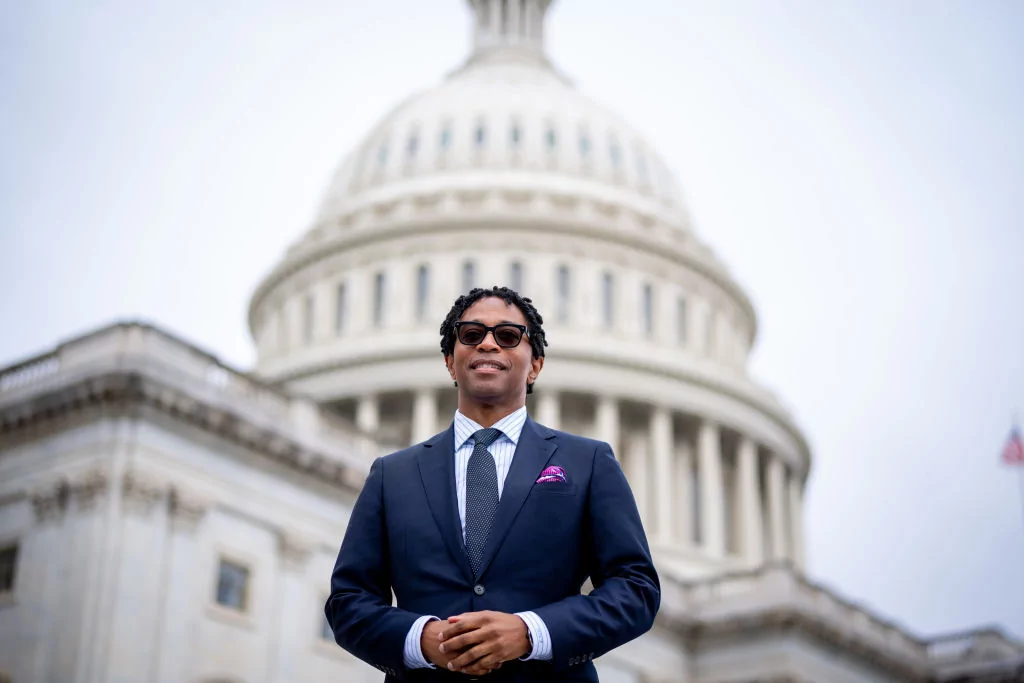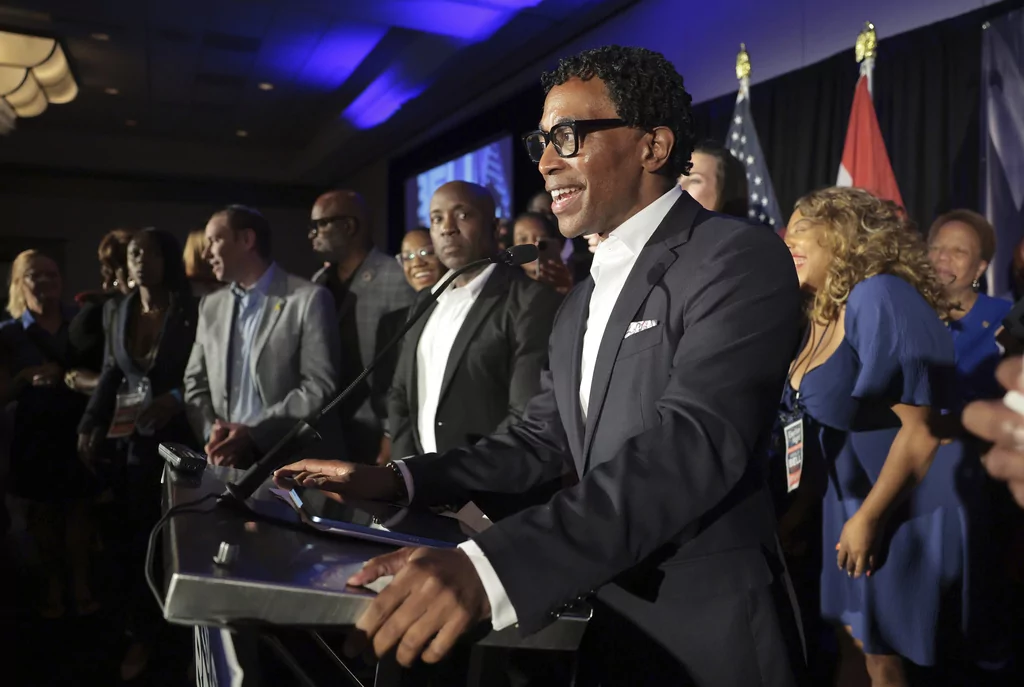
The 2024 election cycle has ended, with Republicans holding control of all three branches of government. The Washington Examiner interviewed over two dozen new members as they prepare to take office in January. Part 11 of Capitol’s new crop will introduce Rep.-elect Wesley Bell (D-MO), who ousted a sitting congresswoman in a high-profile primary race.
Rep.-elect Wesley Bell’s (D-MO) term in the House will focus on constituent services and bipartisanship, two areas where he thinks his predecessor, Rep. Cori Bush (D-MO), failed.
Bell, who serves as St. Louis County’s prosecuting attorney, was the second Democrat and third challenger overall to oust an incumbent in the 2024 primaries. He defeated Bush by 5.6 percentage points, with nearly 7,000 residents in Missouri’s 1st District voting to oust their two-term congresswoman whom they criticized for her voting record in Congress, constituent accessibility, and stances on public safety.
In an interview with the Washington Examiner, Bell said his decision to enter the Democratic primary came after he noticed his conversations with multiple constituents and party leaders sounded similar.
MEET THE NEW CONGRESS: THE HOUSE AND SENATE FRESHMEN ELECTED TO SERVE NEXT YEAR
“It became abundantly clear, a reoccurring theme: ‘Your congressperson doesn’t work with others,’ and going to D.C. and meeting with folks — not only stakeholders but folks connected to the Democratic Party — it was repeated even more,” Bell said. “A lot of the messages of, ‘Hey, your congressperson isn’t working with folks, and it’s hurting your district.’”
“And I think that was the straw that broke the camel’s back,” Bell added.
Where Bell thinks he can thrive in a way Bush did not is not only building relationships within various Democratic coalitions but also across the aisle.
Of Bush’s 39 sponsored bills, resolutions, and amendments since she arrived on Capitol Hill, none of them received a Republican co-sponsor. Only one, a bill to improve language in the United States Code, passed the House. Of the 755 bills she’s co-sponsored, only 24 were introduced by Republicans.
As a progressive Democrat, Bush kept her relationships with other Democrats mostly within the “Squad” — particularly as the war in the Middle East between Israel and Hamas drove a further wedge between progressives and establishment Democrats.
“As a prosecutor, as a city councilman, what I recognize is that when we have different voices from different backgrounds, from different experiences, we were more likely to get to the right decision because we had folks that were chiming in from all different perspectives,” Bell said.
“We’re going to continue that model because, quite frankly, if bringing people together isn’t good enough, I don’t want the job,” the newest Missouri congressman added. “So I’m going to stand by my values and my principles, and I’m going to work with every group, whether they agree with me or not. We’re going to extend those olive branches and get work done for this region and for the American people.”
Bush’s team pushed back on Bell’s characterization.
“The campaign season is over, and the congresswoman has no intention of engaging in petty, disproven tit-for-tat comments with Mr. Bell,” a spokesperson for Bush’s campaign told the Washington Examiner.
“As she works to close out her term, the congresswoman is laser-focused on continuing to deliver for Missouri’s First District — not further dividing it. We’d advise Mr. Bell to do the same,” the spokesperson continued.

Bell’s path to Congress almost led him to Senate
Before taking a step into national politics, Bell dreamed of being a public defender. However, he realized that as a defense attorney, he would be helping one individual at a time, whereas a prosecutor has a bigger reach.
“I realized I could do more and give more back and make more of an impact in our community as a prosecutor,” Bell said.
Bell, then a Ferguson city councilman, became the first black prosecuting attorney in St. Louis County when he took office in 2019. He defeated longtime county prosecutor Bob McCulloch, who declined to charge Darren Wilson, a Ferguson police officer, for shooting and killing Michael Brown, a young black man whose death rocked the community and made national headlines with the Black Lives Matter movement.
After three years in the role, Bell set his sights on Capitol Hill. His first bid was to oust Sen. Josh Hawley (R-MO) in the Senate. However, in 2023, he decided to withdraw his bid for the upper chamber and run against Bush.
“Interestingly enough, as I was getting around the state with respect to the Senate race, is when I started to realize the need for a change in our congressional district,” Bell said.
He said he didn’t think the representation in Congress from Bush was reflective of his values.
VOTERS SEND HISTORY-MAKING CANDIDATES TO CONGRESS
“I attributed that mostly to the fact that, at that point, I was in law enforcement and our congressperson, our current congressperson, at the time was more of ‘defund the police’ on that agenda,” Bell said. “So I thought that lack of representation was just because I served in this role.”
After communicating with constituents and both state and national Democrats, Bell said he realized there was a consensus: Bush was no longer the right representative for the 1st District.
“If you’re not up there building relationships and building coalitions — because everything that you do up there is based on majority — and if you’re not doing that, you’re not serving your constituents,” Bell said.
“I believe we weren’t getting that, so that was part of what propelled me to get into the congressional race,” he added.
During the House primary this summer, Bush attacked Bell for his prosecuting career, including that he did not reopen the case against Wilson. Brown’s death also ushered Bush to Congress after she defeated former longtime Democratic Rep. William Lacy Clay in the 2020 elections, partly because of momentum and outrage over Brown’s and George Floyd’s deaths.
Bell will have to return to Missouri next year for a trial of a discrimination lawsuit scheduled for Jan. 27. He is accused of firing people based on gender, age, and race. He has denied wrongdoing.
Heading into the new Congress, one of Bell’s biggest priorities will be to tackle gun violence, a matter that hits the 1st District hard, he said — particularly in the black community that makes up a large portion of the 1st District.
More of his priorities include regional growth, as well as access to healthcare and the cost of living.
“Over and over, folks would come up to me on the streets, at the polls, in the grocery stores, would just say, ‘We want somebody that’s going to go up there and work for us,’” Bell said.
Bell is looking to join the Appropriations, Transportation and Infrastructure, and Financial Services committees — panels he believes could bring back “deliverables” for his district.
“[My constituents] want folks up there that are going to go up there, work together, and deliver those results,” Bell said. “And so I promised, when I ran for office, that I was going to run on accountability. I was going to run on being I was going to show up, and those are two promises that I plan to keep.”

With Bush gone, are progressives welcoming Bell?
The 1st District’s primary was shaped primarily by outside spending from pro-Israel groups targeting Bush for her anti-Israel comments and support of Palestinians. AdImpact found that $17 million was poured into the district, with most of the funds going toward ads attacking Bush and supporting Bell.
Bell was backed by the American Israel Public Affairs Committee, the largest pro-Israel organization, and its PAC, the United Democracy Project. AdImpact found UDP spent $8 million in support of Bell.
All of Bush’s fellow “Squad” members, including ousted Rep. Jamaal Bowman (D-NY), rallied behind her ahead of the primary, slamming Bell for taking money from billionaires “to send out ads attacking this beautiful black woman.”
Following her loss, Bush gave a fiery, 18-minute concession speech in which she warned AIPAC to “be afraid” of her.
“AIPAC, I’m coming to tear your kingdom down,” Bush said. “And let me put all of these corporations on notice. I’m coming after you, too!”
“Because now, there are some strings that I have attached,” the defeated congresswoman said. “And as much as I love my job, all they did was radicalize me, and now they should be afraid.”
In response, White House press secretary Karine Jean-Pierre pointed to previous remarks from President Joe Biden, arguing Bush’s rhetoric was “inflammatory and divisive and incredibly unhelpful.”
Braxton Payne, a Democratic strategist in St. Louis, told Jewish Insider shortly after Bell’s primary win that the race ultimately pitted progressives against progressives. While Israel was a large factor, Bush’s downfall came down to her track record of missing votes and her votes against the Biden administration on matters such as the Bipartisan Infrastructure Bill and child tax credit.
“He was the original progressive in this area that took on a more traditional Democrat in a time where there wasn’t a Squad … and he won with little to no money,” Payne told the outlet. “He became very popular with the progressive groups, so Cori Bush trying to hit him [as] a Republican or wolf in sheep’s clothing … didn’t resonate with a lot of Democratic and progressive voters and older Democrats” who had been close with Bell for years.
TRUMP CABINET PICKS: WHO’S BEEN TAPPED TO SERVE IN THE PRESIDENT-ELECT’S ADMINISTRATION
Bush, as an incumbent, had the Congressional Progressive Caucus’s PAC endorsement. However, the CPC did not extend that endorsement to Bell once he became the Democratic nominee for Missouri’s 1st District, despite aligning with several of their values.
Sophie Mittelstaedt, Congressional Progressive Caucus spokeswoman, told the Washington Examiner that members can apply for membership to the caucus both as candidates and once they’ve been sworn in. As candidates, they can apply for the CPC PAC endorsement, which would automatically allow candidates to join the caucus if they win.
As a member, Rep. Pramila Jayapal (D-WA), CPC chairwoman, told the Washington Examiner there is an application process where prospective members have to agree to several commitments and pay dues.
The CPC has added nine new members to its ranks, including Rep.-elects Dave Min (D-CA), Maxine Dexter (D-OR), LaMonica McIver (D-NJ), Laura Friedman (D-CA), Luz Rivas (D-CA), Sarah McBride (D-DE), Yassamin Ansari (D-AZ), Lateefah Simon (D-CA), and Nellie Pou (D-NJ). However, more could join as final House races are called or during the 119th Congress.
“Last session, I know we added people during the course of the year, and I anticipate we’ll do that again,” Jayapal said.
Bell’s campaign confirmed that he did not seek the CPC PAC endorsement even after beating Bush. However, the new member said he’s met with several CPC members and felt “welcomed and encouraged” to join the caucus by those members despite ousting their beloved colleague.
“I think we all know that politics is politics, and elections are elections,” Bell said. “No one has ownership of these seats. They’re all temporary, and they belong to the people, and at the end of the day, people are going to make the decision on who should represent them.”
Bell said he has not spoken to Bush about a transition as of new member orientation, stating that it’s “important to give the congresswoman space and grace.”
The Washington Examiner reached out to the CPC to see if they planned on inviting Bell to join the caucus. For his part, Bell is not concerned with what caucuses he is joining — other than the New Democrat Coalition, of which he became a member during new member orientation.
CLICK HERE TO READ MORE FROM THE WASHINGTON EXAMINER
“The only thing that I’m actively doing now is preparing to hit the ground running on January 3,” Bell said when asked if he is actively pursuing the CPC membership.
“That’s something I’m absolutely considering and interested in, but my priority right now is finding where the bathrooms are, getting our office set up, make sure that on day one, our district office, as well as our D.C. office, is ready to go so that we can serve the folks of this region and this country,” he added.







